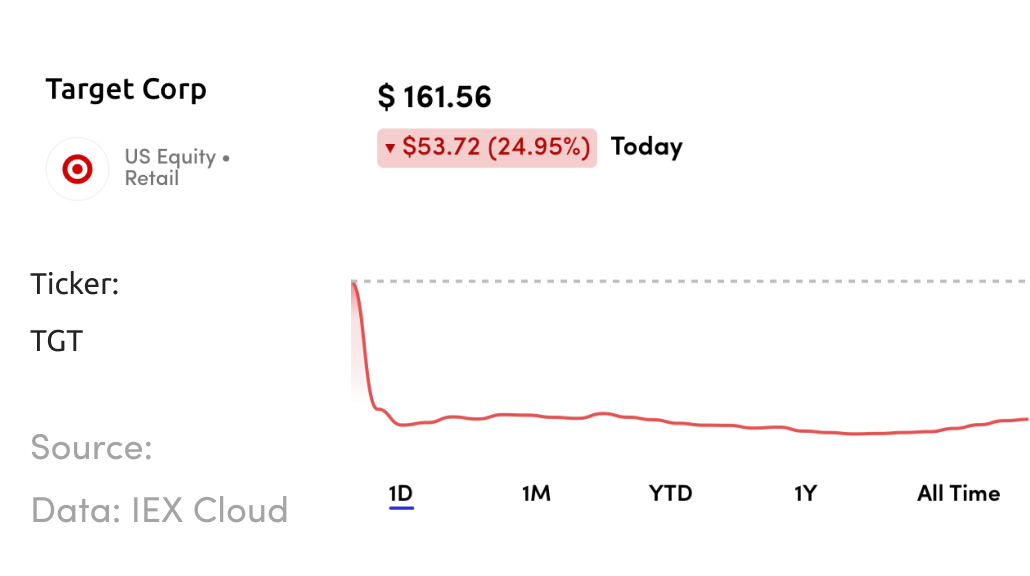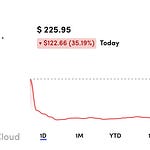Listen to Founder Chats: This week we spoke with Ed Mehr of Machina Labs, which is taking on metal forming with robots and software in a way that can onshore manufacturing and revitalize American factory towns.
Machina’s Metal Forming Process
TAI’s Daily Brief - May 18th, 2022
The Market sank today over fears that inflation will start to eat heavily into corporate earnings. All major market indexes were down:
• The S&P 500 was down by -4.04%
• The Dow fell by -3.57%
• The NASDAQ Composite plunged by -4.73%
• The Russell 2000 sank by -3.56%
Following Yesterday's short-lived rally, the Market fell sharply following a whirlwind financial reporting session for big-box retailers. The reports showed that US consumer demand was dropping in the face of high inflation.
Wall Street worries that the poor earnings could be another indicator that inflation is starting to weigh on companies' profitability and preclude an economic recession. In response, haven assets, such as the US dollar, gold, and US Treasuries, gained as investors repositioned their portfolios out of equities and into traditional stores of value.
This negative sentiment has caused a near bear market for the S&P 500, down 18.5% since its all-time high on January 3rd. A bear market is defined as a -20% drop from a recent high.
Big Retailers signal that inflation is affecting Profits
Over the last 48 hours, big-box retail giants Walmart, Target, Home Depot, and Lowe's reported disappointing earnings for the first three months of the year. Earnings for Walmart and Target showed that consumers are starting to pull back from premium and high-ticket items with larger profit margins.
This drop-off in consumer demand for higher-margin items comes as wholesale prices have skyrocketed for companies due to supply chain bottlenecks and increasing input costs for materials and energy.
Target reported that profits for the first quarter fell more than 50% since the same period a year ago. The company predicts that fuel and transportation price increases will amount to $1 billion in additional costs for the company over the year.
Target has something on its back, as it dropped ~25% today
Walmart has seen its inventories grow by more than 30%, reflecting increasing wholesale costs for goods and consumers holding off on purchases. Excess inventory may need to be sold at a loss or written down.
Home Depot and Lowe's consumer demand was less affected during the first quarter. Their customer base is primarily homeowners, which have seen home equity values soar over the past two years, and contractors. However, both companies note that they've had to pass on higher wholesale costs to consumers through price increases.
Why does this matter?
Throughout the economic reopening, many companies saw profits reach all-time highs due to strong consumer demand despite rising prices. However, it seems that the consumer's threshold for higher prices hit a wall in the first quarter.
Big box retailers make up a sizable portion of total retail sales and indicate a trend that all retailers likely face. Higher fuel and food prices and falling stock portfolios have caused consumers to become wearier of large purchases.
While prices for consumers may drop as these retailers need to sell their excess inventory at potentially steep discounts, it doesn't bode well for corporate profits. Wall Street expects second-quarter earnings to be down for companies as they're hit by both less consumer demand and higher costs.
This potential profit slide affects the earnings side of the price-to-earnings (P/E) ratio, which is a crucial metric for company valuations. So even if a company’s P/E multiple remained the same, the "E" is smaller, causing the company’s valuation to fall.
For example, if a company has a 10x P/E multiple, and earnings one year are $10, then it’d be worth $100 (10 x $10). But if Earnings fall to $5, then the value would be $50 (10 x $5). This oversimplification helps show how inflation is dragging on share prices.
About Machina Labs
Machina uses an incremental forming process where two robots press against sheet metal to form complex parts over time.
These robot cells eliminate the need for expensive metal dies and fixed tooling, meaning they can make just about any pressed shape.
Machina’s process allows for quick prototyping of metal parts, which can scale to production volumes for aerospace, automotive, construction, etc.
Co-founders Ed (SpaceX) and Babak (Novelis) have deep industry expertise and announced a $16 million raise last November, led by Innovation Endeavors.
Read further:
Associated Press: Consumers shift again, flummoxing big retailers like Target













